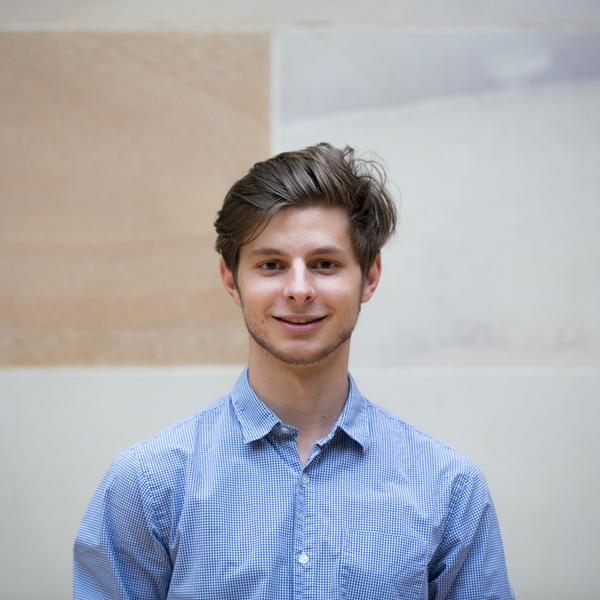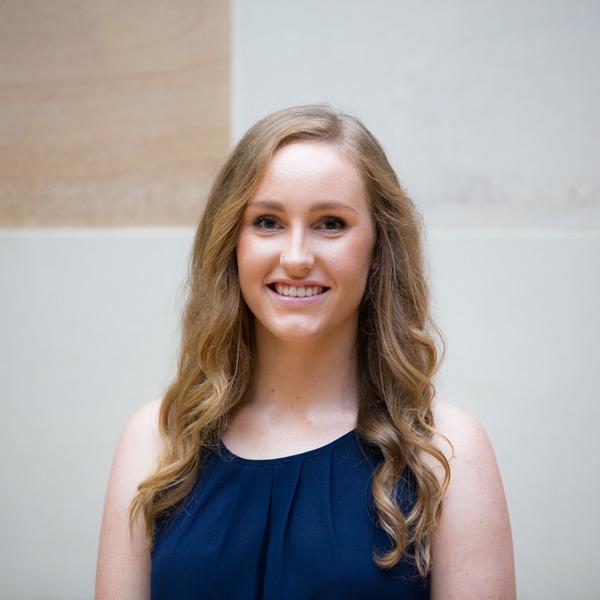Chris McMillan
PhD Candidate, School of Chemistry and Molecular Biosciences
Chris McMillan is a PhD student at The University of Queensland working in a molecular virology lab. After completing a Bachelor of Science in 2015, he started research on influenza vaccines during his Honours year. His research focuses on viruses, how they make people sick and especially, how we can prevent the impacts of viruses on our health. Currently, Chris is investigating the influenza virus and developing a universal influenza vaccine – one that you only need once, and that will protect you from all strands of the flu! His team has been able to produce a vaccine 80 times more effective than the current flu treatment and they believe their work can be expanded to develop vaccines for other viruses, such as the Ebola virus. Chris’ TEDxUQ talk will outline his research journey thus far and discuss the promising progress that has been made towards reaching a flu-free future.
Claire Jones
Founding Director of Australian Refugee and Migrant Care Services (ARMCare)
Claire founded Australian Refugee and Migrant Care Services (ARMCare) to address the health gaps experienced by refugees in Brisbane. Ineligible for citizenship after Kenyan independence, Claire migrated with her family to South Africa as a teenager, where she completed three veterinary degrees and worked as a specialist veterinarian, researcher, lecturer, academic, and as an invitational speaker across Western Europe. She won the Clinical Excellence Award of the South African Veterinary Association in 1991. In 1998, Claire again made the difficult decision to leave her home country with her family, this time to Australia, where she worked as a veterinarian before completing a Master of International Public Health with Dean’s Commendations at The University of Queensland. In 2012, she began her work with refugees, for which she was awarded the 2017 Hesta Primary Health Care Individual Distinction Award.
Edwin Trevor-Roberts
Career Expert, Researcher, and CEO of Trevor-Roberts
Edwin Trevor-Roberts’ working life is devoted to understanding the critical intersection between individuals and their work. This immersion in research and practice has centred on how the world of work is evolving in response to changes in society, technology, and organisations. His journey has seen him work in the UK and Canada and present to a wide range of audiences worldwide. Edwin holds a PhD from The University of Queensland’s Business School. He is a regular writer on career issues and has co-authored several articles and book chapters on careers, culture, and leadership. As CEO of the career management firm Trevor-Roberts, Edwin also has significant experience guiding organisations of all sizes through transformational change driven by industry reform and disruption. Edwin is looking forward to challenging the dominant negative narrative about work - as something we ‘have’ to do - and offering instead an alternative view that reframes work as something positive.
Eugeni Roura
Principal Research Fellow, Centre for Nutrition and Food Sciences, QAAFI
Eugeni is a nutritional chemosensing scientist. After obtaining a degree in Veterinary Sciences at The Universitat Autònoma de Barcelona, Eugeni completed a PhD in digestive physiology and nutrition. He joined The University of Queensland in 2010, where he currently leads a research team focusing on uncovering the mechanisms involved in sensing dietary nutrients and their involvement in appetite modulation. Recently discovering new functions of bitter- tastinge compounds, Eugeni and his team have been focusing on the understanding of the bitter taste system using the pig as a model, studying the function of bitter-sensing cells that are present not only in the tongue but also in the gut epithelia, helping orchestrate the hunger-satiety cycle. Additionally, bitter taste sensory cells have been found in the respiratory system, helping activate the immune response against pathogens, and in the cardiovascular system, where they seem to be capable of lowering blood pressure.
Jason Whitfield
CSIRO Synthetic Biology Future Science Fellow
Originally from rural New Zealand, Jason studied Biochemistry at The University of Canterbury. After completing his undergraduate degree, Jason migrated to Australia to obtain his PhD, focusing on designing biosensors for neurotransmitters, from The Australian National University. Currently, Jason competes in athletics and is a CSIRO Synthetic Biology Future Science Platform Fellow at The University of Queensland. Jason’s work focuses on developing methods to detect and monitor small molecules inside cells or in bodily fluids. The research field Synthetic Biology allows us to “hack” biology, re-engineering it to help address the challenges of modern society in a sustainable manner. His TEDxUQ talk brings together his passion for sport and molecular curiosity, exploring the possibilities behind using synthetic biology principles to re-purpose the technology used in glucometers for sports anti-doping and high performance.
Kelly Virginia Phelan
Senior Lecturer and Fulbright Fellow in Tourism
Kelly Virginia Phelan is a tourism researcher and lecturer at The University of Queensland. She served as a Fulbright Scholar and Visiting Associate Professor at The University of Botswana during 2013 and 2014 where she taught classes and conducted research related to tourism development initiatives in sub-Saharan Africa. Kelly’s research has examined volunteer tourism, conservation efforts, challenges associated with sustainability and ecotourism, and the host/guest interaction. She is passionate about developing infrastructure, practical training opportunities, and tourism activities through unconventional means to advance local communities. After living and working in 17 countries throughout Africa over the past decade, Kelly has learned one thing that she’ll be sharing with the TEDxUQ audience: Africa is not a continent that needs to be treated like a charity case, it is one to be celebrated, and the best way to do that is by visiting.
Kristen Lyons
Associate Professor, School of Social Science
Kristen is an Associate Professor in Environment and Development Sociology in the School of Social Science at The University of Queensland. Kristen has over twenty years’ research, teaching, and service experience, she is committed to delivering positive social change on national and international issues that sit at the intersection of sustainability and development. Kristen works in Africa, the Pacific, and Australia, and her work is grounded in a rights-based approach. This focus has centered the rights and interests of local communities, especially Indigenous peoples, in her research design and collaboration.
Lee Hickey
Senior Research Fellow, Centre for Crop Science, QAAFI
Dr Hickey is an emerging leader in the field of plant breeding and genetics. He leads a research team working on Australia’s most important cereal crops, wheat and barley, situated within the Queensland Alliance for Agriculture and Food Innovation at The University of Queensland. His lab investigates the genetics of disease and drought resistance in order to design more robust crops for farmers. Dr Hickey has played a pivotal role in developing 'speed breeding', the rapid generation advance technology, which enables up to six plant generations per year and provides a powerful tool for crop improvement.
Sabrina Chakori
PhD Candidate and Founder of Brisbane Tool Library
In 2017, Sabrina founded the Brisbane Tool Library, a social enterprise that aims to reduce household waste and consumption based on a sharing economy. Convinced of the need to change the roots of our economy in order to solve our social and ecological crises, Sabrina redirected her interests from science to economics after completing a Bachelor of Science in Biology in Switzerland and a Master of Science in Environmental Economics at The University of Queensland. For more than a decade, Sabrina has been advocating for a more sustainable global society, leading to numerous collaborations including an initiative with Queensland’s Environment Minister to introduce the law banning single-use plastic bags. Her book chapter in Positive Steps to a Steady State Economy and her paper, The necessity to change the term consumer, both focus on the need to rethink our consumption addiction. Sabrina is currently completing a PhD at UQ, focusing on the circular economy and food packaging.
Scott Millar
Entrepreneur, CEO and Founder of BOP Industries
Starting his entrepreneurial journey at age 14, Scott Millar is now the 18-year-old CEO and founder of Brisbane-based startup BOP Industries, which is on a mission to make learning about new and emerging technologies fun, engaging and, most of all, creative! Growing his company from selling keyrings at local markets to now running workshops and events across the country, he is a passionate advocate for young entrepreneurs and all things technology. Along his journey, however, Scott found a disconnect between the technology he was using in the industry and the technology he was learning about in school. Scott looks forward to reflecting on how technology is currently taught, looking at the good, the bad, and where we can improve. As a student and educator, Scott has found some fantastic ways for teachers to implement technology in the classroom in a fun, simple, and creative manner and looks forward to sharing his knowledge.
Tim Anderson
Designer, Facilitator, and Innovator
Tim is a designer, facilitator, and innovator who loves collaborating with people to develop powerful ideas that have a positive effect. He enjoys tackling difficult problems and leans into complexity. From a corporate perspective, Tim was part of the select team tasked with establishing an Innovation Lab for Suncorp Group. He has played a major role in the design and delivery of technical projects, developed communications strategies to support structural and cultural shifts, and recently managed strategic risk through innovation and reinvention of the Suncorp business model. In the entrepreneurial ecosystem, Tim is the co-founder of FinTech QLD and in his spare time facilitates hackathons. He has facilitated Myriad's Hack the Reef and Australia's first Homelessness Hackathon, and organised Brisbane's inaugural FinTech Startup Weekend. Tim now combines his passion for FinTech with his enthusiasm to help organisations drive a culture of innovation at GLASS, Brisbane.
Zoe Brereton
Undergraduate Arts/Law (Honours) student, inaugural New Colombo Plan Fellow for India
Zoe is a final year Bachelor of Arts/Bachelor of Laws (Honours) student at The University of Queensland. Since January 2015, Zoe has worked as a legal research assistant for Professor Simon Bronitt with a particular focus on rape law reform. In early 2015, Zoe became the inaugural New Colombo Plan fellow for India, where she spent 12 months conducting socio-legal research into police investigations of crimes against women and later interned for Justice Gita Mittal on the Delhi High Court. Zoe was awarded the Australian Academy of Law Prize for her presentation of this work at the 2017 National Law Honours Student Conference. Drawing upon early drafts of the Indian Penal Code, the experiences of women who report sexual violence, and her conversations with police officers, Zoe’s talk will look to the development of the Indian doctrine of ‘rape by fraud’ as a case study to explore how culture shapes concepts such as consent and autonomy.

